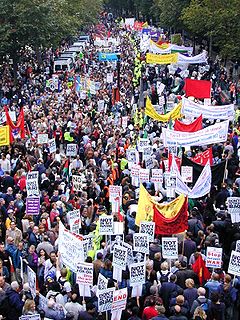
Keith Flett on the Noughties: Making our history count
From LSHG Newsletter, No. 37 (January 2010)
No doubt many readers of this Newsletter have been busy in recent months, as I have myself, sorting out solidarity with the CWU, opposing the BNP and campaigning to get troops out of Afghanistan. Busy or not, time moves on and that means that history is being written all the time.
Of course assessments of the last few months, or even of 2009, are journalism not history, but as the first decade of the twenty-first century, the Noughties, draws to a close, the initial very provisional attempts to write its history will be made.
Any judgements on the last decade cannot be anything but the very first drafts of history that will need to be reviewed as memoirs and official records become available in decades to come.
Nevertheless judgements made now may set the tone for later understandings and that means the battle as to how we understand the past ten years is already being joined.
For example, can you remember what you were doing on Saturday 15th February 2003? As historians we should be acutely aware of how useless it is to rely on one’s personal memory which is invariably partial and defective. Even so, I can recall well that on that Saturday I, along with two million others, were on the largest march ever in British history, organised by the Stop the War Coalition, against the war in Iraq. At the time it could not be ignored and it is still widely recalled. Recently I had a casual discussion with a union official about someone we had both met on that demo as a youngster who by 2009 had become a socialist activist. That was a heartening story. So clearly any historical account of the Noughties will need to have the 15th February 2003 as one of its key events.
Or at least that’s what you might think. But on 17th October the Guardian published a whole issue of its Weekend magazine covering the Noughties without any mention of the demo. Nor did it carry any comment on its omission the following week. On that basis I think we may be fairly sure that some, although certainly not all, editorial voices at the Guardian would prefer not to recall 15th February 2003. It was a huge demo and it was anti-war, both subjects that they find difficult. It goes wider than that. From the first demonstration against war in Afghanistan in autumn 2001 through to the protests against the Iraq war and now Afghanistan again, not forgetting the huge protests around Gaza earlier this year and Lebanon in 2006, anti-war activities have been a consistent theme of the Noughties.
We are set to be deluged with histories of the Noughties so there is a task for socialist historians this winter.
You may see a review of the decade published that does not mention the efforts of the Stop the War Coalition, or, as likely, simply chunters on about the ‘War on Terror’ and how fighting illegal wars is absolutely necessary to the security of the UK without suggesting in any way that not everyone has agreed. If so, then write or e-mail in and complain.
We have a chance now to shape how the history of the past decade is written and we owe it to future generationsto make sure that history includes the cold but inspiring Saturday in Hyde Park in 2003 and the impact the Stop the War Coalition has had here and internationally in the last ten years.Of course it is far too soon to say what the historical impact of the anti-war movement will be, but the first task is to make sure that
is on the historical agenda in the first place.
KF

No comments:
Post a Comment